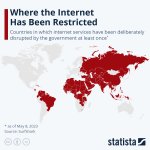The arrest of former prime minister Imran Khan in Pakistan yesterday has led to nationwide uproar and protests. In the city of Peshawar, a local hospital has reported three people being shot dead and a further 27 suffering injuries. In the state of Punjab, where the army was deployed, officials said that 945 arrests had been made and 130 police officers injured.
In addition to the government's response on the ground, there have also been restrictions put in place on access to internet services such as mobile connections and social media sites. As this infographic shows, Pakistan is one of many countries around the world whose government has taken the step to disrupt internet services in response to some kind of civil unrest or political event.
Before the latest disruption, a database by Surfshark had recorded 12 cases in Pakistan - five due to protests, one an election and 6 connected to general political turmoil. India has the highest number of internet restrictions, with 108, the majority of which (83) were connected to protests.
In addition to the government's response on the ground, there have also been restrictions put in place on access to internet services such as mobile connections and social media sites. As this infographic shows, Pakistan is one of many countries around the world whose government has taken the step to disrupt internet services in response to some kind of civil unrest or political event.
Before the latest disruption, a database by Surfshark had recorded 12 cases in Pakistan - five due to protests, one an election and 6 connected to general political turmoil. India has the highest number of internet restrictions, with 108, the majority of which (83) were connected to protests.


